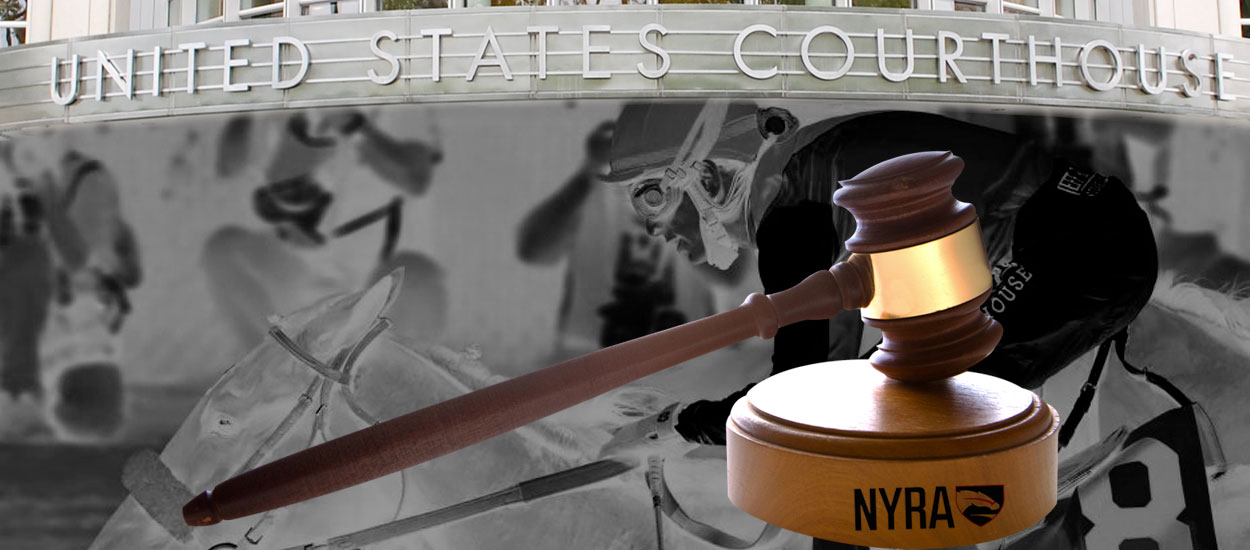Reversal of Baffert ban another black eye for horse racing
On Wednesday in Brooklyn, Carol Bagley Amon, United States District Court Judge for the Eastern District of New York, overturned the decision by the New York Racing Association (NYRA) to ban Bob Baffert from racing in New York after Medina Spirit tested positive for a banned substance in the Kentucky Derby. In her decision, the judge said that the NYRA violated Baffert's constitutional rights by rushing to judgement and not allowing Baffert to dispute the claims before the ban was imposed. Amon said that the decision violated his 14th amendment right to due process. Baffert's attorney Henry Greenberg applauded the judge's decision, indicated it was a first step to writing a wrong in all jurisdictions and added:
"Bob Baffert and NYRA have had a good relationship in the past. My hope is that they can get to that point again for the overall good of horse racing." While the NYRA did not issue an immediate rebuttal, they did say that they had to make a quick decision since the Belmont Stakes was only a few days away after the positive test was confirmed and they wanted to make sure that the integrity of their biggest race was upheld, which meant banning a trainer who was caught cheating.
While the NYRA did not issue an immediate rebuttal, they did say that they had to make a quick decision since the Belmont Stakes was only a few days away after the positive test was confirmed and they wanted to make sure that the integrity of their biggest race was upheld, which meant banning a trainer who was caught cheating.
The decision by the judge has sparked outrage on social media as almost every Twitter post has lambasted the Federal court ruling and questioned the whole purpose of having a regulatory board in the first place, if the courts are simply going to overturn their decisions. The following are a sample of Twitter posts:
"Having good lawyers shouldn't allow for trainers who've benefitted from juicing horses to keep competing."
"The guy is doping his horses and is a cheat. Your sport is a joke in this country. Every legit trainer should pull their horses out of every race where he has runners."
"And this is why Irish and British horse racing will forever be miles above American horse racing overall."
"Not a Baffert hater and happy for those employed by Baffert that would have been effected, but surprised by the court ruling. It seems like the times though....no one is punished or responsible for what they do these days."
"Why are federal courts ruling on regulator decisions? It defeats the whole purpose of having a separate body create rules that is best for their business. The law is an ass."
The Twitter posters are right
While Judge Amon may have viable legal reasons for the ruling, the optics are terrible. In recent years the sport has been facing sharp criticism in North America over what many view as an indifference by the industry to ensure animal safety, including decisions that only serve to maximize profit at all other costs.
There was indisputable proof that synthetic racetracks were better for horse safety than dirt tracks, since the number of catastrophic breakdowns dropped dramatically when tracks installed polytrack, tapeta and similar surfaces. Yet, when those tracks needed to replace the synthetic surfaces, most opted to reinstall dirt tracks instead saying they were cheaper, plus bettors didn’t like trying to handicap synthetic tracks.
There was also a concern that horses were racing too frequently and trainers were often asked to run horses when they weren’t ready solely to help fill fields. This has never disputed by racetracks, but it was also never addressed or rectified.
In 2019, after 37 horses died at Santa Anita Park, it seemed the industry was finally taking things seriously. The Stronach Group, which owns Santa Anita and other major tracks, instituted a comprehensive ruling to ensure that race day doping was banned - An Open Letter about the Future of Thoroughbred Racing in California - Santa Anita Park. In her press release, Stronach Group President Belinda Stronach insisted that race day drugs were the biggest culprit in horse breakdowns, so her company was going to make sure that it was dealt with in an effort to minimize the possibility of horse deaths. And it seems that it worked to some degree since horse deaths at the California track are down significantly the last two years. And while Stronach and the industry may be able to say, “look what we’re doing to address this problem”, a court decision like the one in New York that undermines a regulator’s choice to punish an offender as they see fit, makes the whole process seem cheap and irrelevant.
If this was Baffert’s first offense it might be overlooked, but Baffert has a history of drugging horses, and he always seems to find an excuse. Whether it was a suggestion that a horse ate feed that a groom urinated on, or whether, as was the case with Medina Spirit, that the drug was in an ointment which he didn’t realize was an ingredient, the excuses at some point become meaningless. And more importantly, the measures taken by regulators and horseracing executives like Stronach to stop cheating become irrelevant if the courts interfere, as was the case with this NYRA decision. Add to that the recent story in the New York times which suggested that 2018 Triple Crown winner Justify, also trained by Bob Baffert, was allowed to race despite testing positive for a banned substance (scopolamine) of which several entities were involved in the cover up, is making the whole industry look seedy.
It’s also notable that this seems to be the only sport where the courts interfere this way. Bans and suspensions take place frequently in sports like hockey, baseball, and football and many times players appeal. But the ultimate decision on the player’s fate is left up to the sport itself. It’s hard to find any instance where a decision by a major league commissioner was appealed to a Federal court and certainly never where a court reversed a league’s ruling.
When Major League Baseball banned Pete Rose from baseball, including his induction into the Hall of Fame for betting on the game, he appealed to the league itself and the ban was upheld. He never threatened to take it to a Federal court. And no doubt if he did the court would have said it wasn’t their jurisdiction. And when Lance Armstrong was banned from cycling for steroid use and all his titles were taken from him, he didn’t go to Federal or International court to get it overturned. He simply accepted that he cheated, made a mistake, and lived with the consequences of his actions. And of course, the same holds true for every athlete that was suspended from Major League Baseball for steroid use.
Many will likely argue that in each of those cases the athlete had the right to appeal the decision before being banned and they would be correct. But as NYRA pointed out, they had to make a quick decision to help protect the integrity of their biggest race and really there is no constitutional rule that demands someone must be allowed to participate in a sport. Just like a restaurant, sporting event or nightclub can ban someone from entering if they believe the person is drunk and they simply don’t want to put up with the shenanigans, NYRA, along with the other racing associations, should have the same right to say that they don’t like what they see and therefore tell an individual to leave and come back only when they believe the person has cleaned up their act.
And one must also look at the situation at the time. There was a lot of anger and frustration among fans, other owners and trainers and industry executives that Bob Baffert was allowed to race Medina’s Spirit in the Preakness despite the positive test. So, waiting until after that race to decide on Baffert would have caused even more consternation in the industry, particularly if Medina Spirit won. No doubt many in the industry and possibly even Baffert himself were relieved when Medina Spirit lost the Preakness.
So, once again the horse racing industry has taken a huge step back after taking a small step forward. This time, however, it’s not the horse racing boards that are to blame, but rather the courts and one trainer in particular. Judge Amon may have been legally right in her ruling, but at what cost to the industry itself?
Don’t be surprised to see interest in the Sport of Kings and attendance at race tracks drop dramatically in the rest of 2021 following this ruling.
Read insights from Hartley Henderson every week here at OSGA and check out Hartley's RUMOR MILL!







































